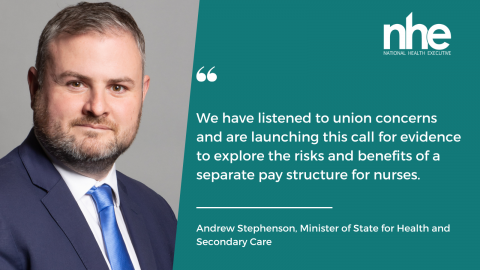The government has launched a new call for evidence to explore the merits of a separate pay structure for NHS nurses.
The Department of Health and Social Care is specifically looking to understand whether the current agenda for change contract is hindering nurses and their career progression.
The agenda for change contract covers more than one million NHS staff, including nurses, midwives and paramedics.
The Royal College of Nursing (RCN) says the agenda for change contract has not kept pace with the evolution and complexity of nursing roles since its original introduction almost 20 years ago.
The RCN’s chief executive and general secretary, Pat Cullen, said: “The genuine advance back in 2004 is ailing the profession today – the pay structure has not kept pace with nursing progress.”

The RCN highlights how nurses typically earn 20% more than the average national salary in other countries, whereas in the UK they make less than the average worker.
Pay progression between bands is also a concern, especially when compared to other professions.
Paramedics, for example, start on band five and move to band six after two years automatically, while nurses only move between bands following a promotion – something that is “unfair and unsustainable” according to Cullen.
“Record unfilled nurse jobs in recent years are a sign of structural problems as well as underinvestment by government,” said Cullen. “As the largest profession in health and care, nursing staff deserve a fresh place in the NHS and not more years of poor pay rises and no wider reform.”
UNISON, the UK’s largest trade union, also responded to the government announcement saying that pitting staff groups against each other was the wrong approach.
Helga Pile, who is UNISON’s acting head of health, said: “Instead of creating divisive distractions, ministers should be looking to grade nurses properly, so they’re paid fairly for their skills and training, improve career progression and offer decent overtime rates for all.”
Andrew Stephenson, health minister, describes nursing as a vital role in the NHS which the government hugely values.
“I want stakeholders to share their expertise and help us collate feedback from across the healthcare sector, ultimately helping to make the NHS a better place to work,” said Stephenson.
The call for evidence will run for 12 weeks before closing at 11:59pm on 4 April.
Image credit: iStock



















